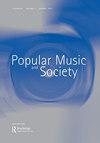The (New) Awakening of Soviet Jazz Culture in the 1960s
IF 1
3区 艺术学
0 MUSIC
引用次数: 0
Abstract
ABSTRACT Following the period of lowest political tolerance toward jazz from the late 1940s to the death of Stalin in 1953, Soviet jazz culture experienced gradual growth during Nikita Khrushchev’s Thaw. This essay argues that the jazz awakening in the 1960s was part of the shestidesyatniki (Sixtiers) movement and that legalization of jazz took place within the frameworks of Soviet leisure activities and amateur culture. In addition, the growth of Soviet jazz was influenced by American jazz diplomacy during the 1950s and 1960s, represented by Willis Conover and his Jazz Hour and the tours of the Jazz Ambassadors.60年代苏联爵士文化的(新)觉醒
在经历了20世纪40年代末到1953年斯大林去世这段对爵士乐政治容忍度最低的时期之后,苏联爵士乐文化在尼基塔·赫鲁晓夫的“解冻”时期逐渐发展起来。本文认为,20世纪60年代的爵士乐觉醒是“60年代”运动的一部分,爵士乐的合法化发生在苏联休闲活动和业余文化的框架内。此外,苏联爵士乐的发展在20世纪50年代和60年代受到美国爵士外交的影响,以威利斯·科诺弗(Willis Conover)和他的爵士时间(jazz Hour)以及爵士大使(jazz Ambassadors)的巡演为代表。
本文章由计算机程序翻译,如有差异,请以英文原文为准。
求助全文
约1分钟内获得全文
求助全文
来源期刊

POPULAR MUSIC AND SOCIETY
MUSIC-
CiteScore
1.10
自引率
0.00%
发文量
33
期刊介绍:
Popular Music and Society, founded in 1971, publishes articles, book reviews, and audio reviews on popular music of any genre, time period, or geographic location. Popular Music and Society is open to all scholarly orientations toward popular music, including (but not limited to) historical, theoretical, critical, sociological, and cultural approaches. The terms "popular" and "society" are broadly defined to accommodate a wide range of articles on the subject. Recent and forthcoming Special Issue topics include: Digital Music Delivery, Cover Songs, the Music Monopoly, Jazz, and the Kinks. Popular Music and Society is published five times per year and is a peer-reviewed academic journal supported by an international editorial board.
 求助内容:
求助内容: 应助结果提醒方式:
应助结果提醒方式:


